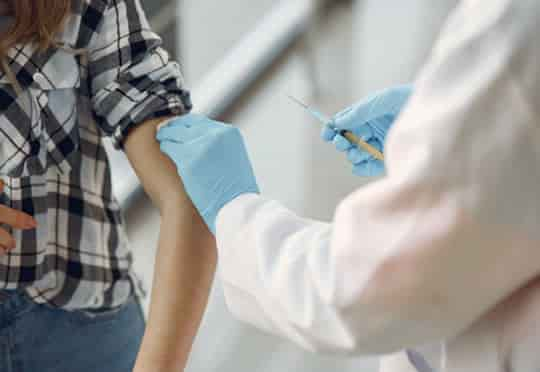Delayed hypersensitivity after the first dose of the Moderna COVID-19 vaccine is often seen in drug reactions.
Some people are having delayed skin reactions after the first dose of the Moderna COVID-19 vaccine and scientists have called for more awareness.
While day-by-day larger population are receiving a vaccination for COVID-19, more studies are coming out featuring new or extended side-effects of the injection.
(Here are the common side-effects of the Moderna vaccine.)
Communicating them to the public helps stop them being afraid of getting the vaccine.
A report on phase 3 clinical data from the Moderna vaccine trial shows that 244 of the 30,420 participants experienced delayed skin reaction after the first dose.
The research team pointed out that clinicians need to prepare their patients for possible side-effects of the first dose including large, red, sometimes raised, itchy or painful skin reactions.
Dr Kimberly Blumenthal, the study’s first author, said:
“Whether you’ve experienced a rash at the injection site right away or this delayed skin reaction, neither condition should prevent you from getting the second dose of the vaccine.
Our immediate goal is to make physicians and other care providers aware of this possible delayed reaction, so they are not alarmed, but instead well-informed and equipped to advise their patients accordingly.”
The paper provides a series of photos on patients with the delayed skin hypersensitivity to the Moderna vaccine.
The severity and size of the reactions varied widely and symptoms include localized rashes on the arm, papules (raised bumps on the skin) on the palm and fingers, edematous plaques (abnormal swelling with fluid), and targetoid lesions.
The adverse reactions began from four days after the first dose to 11 days following vaccination.
The majority were treated with antihistamines and ice but some patients received corticosteroid treatment either orally, topically or both.
However, one case was wrongly treated with antibiotics, Dr Erica Shenoy, study co-author, explained:
“Delayed cutaneous hypersensitivity could be confused—by clinicians and patients alike—with a skin infection.
These types of reactions, however, are not infectious and thus should not be treated with antibiotics.”
These patients recovered from the adverse effects on average 6 days after symptoms occurred.
About half of the patients had recurring reactions two days after receiving the second dose.
However, none of these experienced any worse reaction regarding the second dose than the first injection.
The skin-biopsy test in this study showed a delayed type hypersensitivity immune response which is often seen in reactions to drugs.
Dr Esther Freeman, study co-author,
“For most people who are experiencing this, we believe it’s tied to the body’s immune system going to work.
Overall, this data is reassuring and should not discourage people from getting the vaccine.”
The study was published in the New England Journal of Medicine (Blumenthal et al., 2021).

